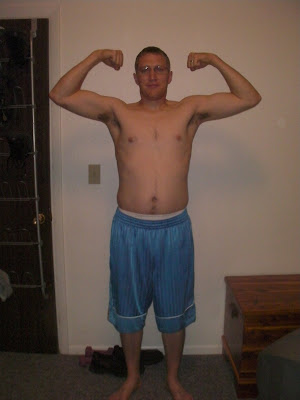About a year ago, my wife Suzy decided she wanted to purchase the  P90X workout program for her birthday. At the time, I thought, of all the things you could get foryour birthday.... why this? After all, I had heard how extreme the program actually was, and I figured she would just be throwing her money awayfor a bunch of DVDs that she would only use for a few w
P90X workout program for her birthday. At the time, I thought, of all the things you could get foryour birthday.... why this? After all, I had heard how extreme the program actually was, and I figured she would just be throwing her money awayfor a bunch of DVDs that she would only use for a few w
 P90X workout program for her birthday. At the time, I thought, of all the things you could get foryour birthday.... why this? After all, I had heard how extreme the program actually was, and I figured she would just be throwing her money awayfor a bunch of DVDs that she would only use for a few w
P90X workout program for her birthday. At the time, I thought, of all the things you could get foryour birthday.... why this? After all, I had heard how extreme the program actually was, and I figured she would just be throwing her money awayfor a bunch of DVDs that she would only use for a few weeks before giving up. Not that I didn't have faith in her, but I just figured it was a program with constant Saturday morning infomercials showing people experiencing unbelievable results was just what you would predict - too good to be true.

But she bought the DVDs, the pull up bar, the bands, and the dumbbells, and she did the program for about 6 weeks. We took pictures and measurements. The results were actually pretty noticeable for only a month and a half. I was impressed. But for whatever reason, she stopped working out, and nothing happened for awhile. Then, in September, I decided I would try the workout with her. We lasted 3 weeks, and I enjoyed the workouts,
but sickness preempted week 4, and we never got back in the groove.
For the new year, Suzy made a resolution that she wanted to complete the full 90 days before her 30th birthday. At the same time, some members of my extended family suggeste
d we do a "Biggest Loser" contest for 12 weeks for anyone who wanted to compete. These two goals combined helped us to become re-motivated, and this time we weren't going to quit part of the way through.
What can I say about P90X? It is extreme. But I have to think that most people could do it if they just consistently would continue to work at it. Sometimes you don't think you're getting the results that you want, but you just have to be patient. The part that may be even more difficult than actually doing the workouts is showing up to work out. In our
case, we usually had to wake up between 4:30-5 a.m. so we could get in a workout before our kids started getting out of bed. The program is very time consuming. You have to plan on an hour to 1.5 hours a day, six days a week.
One other misconception I had about the program is that I would be sore for a week or two, but then my muscles would be used to the rigor of the routine. However, P90X is based on the principle of "muscle confusion," which means you can plan on being sore probably some if not most of the whole program. After awhile, you start to get used to it, and feeling sore makes you feel like you worked hard enough. The thing I liked best about doing the work
outs is the variety (there are 12 DVDs total), and the fact that I pretty much felt like Superman once I had act
ually finished. Doing it first thing in the morning, I felt like I had finished something significant before my real day had even started.
The best part of the program? It works with minimal investment in equipment (although as I got stronger, I had to sink a little more money into heavier weights), and you can get great results right in your basement. No travel time to and from the gym, and no membership fees.
My results? I did not take all my measurements, but I think the outcome is pretty visible. I dropped 10 pounds, from 176 to 166, which is about what I weighed
way back in

my high school days. My jeans, which used to fit just right on my waist, are now hanging at least two or three inches loose.
I don't think I will be winning the biggest loser event, but I think the accomplishment of finishing such an intense workout regimen speaks for itself. I figure if I can do it, anyone can. Now it's time for Insanity!!
Here's a few pics:







